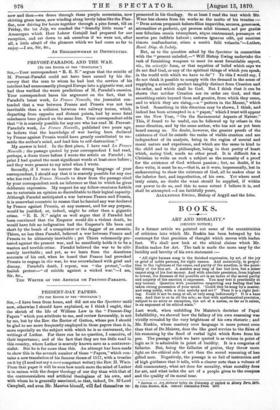PREVOST-P.ARADOL AND THE WAR.
[TO THE EDITOR OF THE "SPROTATOR.1
Sis,—Your correspondent "H. R. N." argues that the suicide of M. Prevost-Paradol could not have been caused by his dis- covery that the man to whom he had lent the service of his intellect had unnecessarily plunged Europe into a gigantic war, and had thus verified the worst predictions of M. Paradol's enemies. Your correspondent bases his argument on the fact, that in Paradol's latest work, La France Nouvelle, the journalist con- tended that a war between France and Prussia was not less inevitable than a collision between two railway trains, which, departing from opposite and distant points, had by some fatal mischance been placed on the same line. Your correspondent adds that "it is scarcely possible for any one who has read M. Prevost- Paradol's work, La France Nouvelle, published two years ago, to believe that the knowledge of war having been declared by France against Prussia would have greatly contributed to un- settle the author's mind, and lead him to self-destruction."
My answer is brief. In the first place, I have read La France Nouvelle ; the passage quoted by your correspondent I had read, perhaps, a dozen times before I wrote the article on Paradol ; in print I had quoted the most significant words at least once before ; and they were present to my mind when I wrote.
Secondly, if I were' to borrow the strong language of your correspondent, I should say that it is scarcely possible for any one who has read La France Nouvelle to draw from the passage cited by your correspondent such an inference as that to which he gives deliberate expression. My respect for my fellow-creatures forbids me to entertain an opinion so discreditable to their logical capacity. Although Paradol anticipated a war between France and Prussia, it is somewhat eccentric to reason that he fancied any war declared by France against Prussia, at any moment, and for any purpose, would be justified, or, indeed, might be other than a gigantic crime. "R. R. N." might as well argue that if Paradol had been convinced that the Emperor would die a violent death, he would have felt no indignation had the Emperor's life been cut short by the bomb of a conspirator or the dagger of an assassin. Thiers, no less than Paradol, believed a war between France and Prussia to be ultimately inevitable ; yet Thiess vehemently pro- tested against the present war, and he manifestly holds it to be a wanton and terrible crime. Paradol believed the war to be ulti- mately inevitable ; and yet, as we learn from the American accounts of his end, when he heard that France had provoked Prussia to engage in this war, he was overwhelmed with grief and dismay. Paradol's death, I repeat, was "the protest,"—the foolish protest—" of suicide against a wicked war."—I am, Sir, Sec.,
THE WRITER OF THE ARTICLE ON PREVOST-PARADOL.






























 Previous page
Previous page